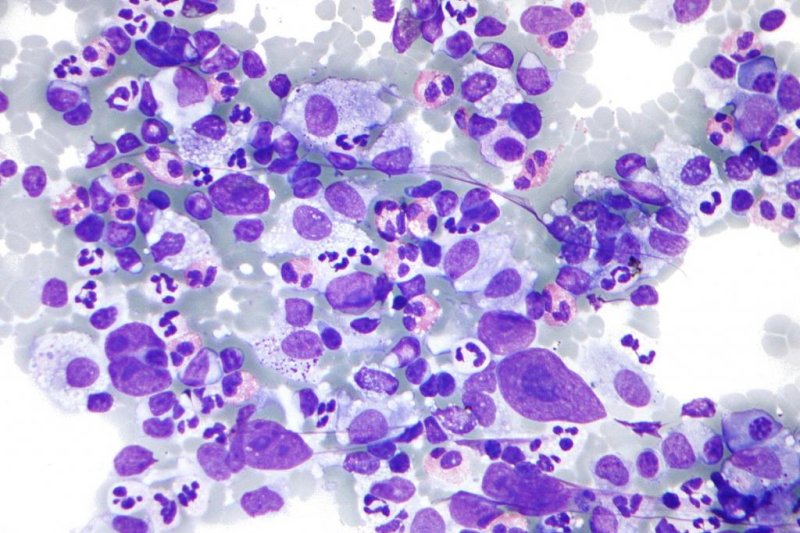This scan shows a mixture of cells common in Hodgkin lymphoma. A blood test has been developed that can within days determine whether patients with diffuse large B cell lymphoma can respond to initial therapy or instead need more aggressive treatment. Image by
Nephron/Wikimedia Commons
Aug. 21 (UPI) -- Researchers have developed a blood test that can within days -- rather than months -- determine whether patients with a blood cancer can respond to initial therapy or instead need more aggressive treatment.
Patients with diffuse large B cell lymphoma, or DLBCL, the most common type of non-Hodgkin lymphoma, were studied before and after treatment. Researchers led by the Stanford University School of Medicine published their findings Monday in the Journal of Clinical Oncology in development of the process they called "liquid biopsy."
"Although conventional therapy can cure the majority of patients with even advanced B cell lymphomas, some don't respond to initial treatment," Dr. Ash Alizadeh, an associate professor of medicine at Stanford, said in a press release. "But we don't know which ones until several months have passed. Now we can predict nonresponders within 21 days after the initiation of treatment by tracking the levels of ctDNA in a patient's blood. We can look earlier and make a reliable prediction about outcome."
Diffuse large B cell lymphoma can arise in lymph nodes or outside of the lymphatic system, in the gastrointestinal tract, testes, thyroid, skin, breast, bone or brain, according to the Lymphoma Research Foundation.
Although it can occur in childhood, DLBCL occurrence generally increases with age, and most patients are over the age of 60 at diagnosis.
"Every year, about 30,000 people in the United States are diagnosed with diffuse large B cell lymphoma and, for the most part, they're treated with six cycles of combination therapy," Dr. David Kurtz, a senior instructor at Stanford, said. "But we know that not all patients need six cycles. A large fraction could be cured with fewer cycles-maybe even just two.
Patients vary widely in responses to treatment because of biological variables. About one-third don't respond to initial treatment, the researchers said.
Circulating tumor DNA reaches the blood by dying cancer cells.
Researchers set out to pick out and read these DNA sequences among the thousands or even millions of other noncancerous sequences in the blood.
"Combined with our recent study on lung cancer, our new findings speak to the power and likely utility of using ctDNA to assess how well cancer treatments are working in an individual patient," senior author Dr. Maximilian Dieh, associate professor of radiation oncology at Stanford. "We are very hopeful that the approach will ultimately be extensible to most if not all cancer types."
Researchers tracked ctDNA levels in 217 people with diffuse large B cell lymphoma at six medical centers, including three in the United States and three in Europe. They compared ctDNA levels before treatment began with the levels after the first and second rounds of conventional chemotherapy -- and correlated changes with each patient's outcome.
In 98 percent of the participants, they found that ctDNA was detectable before therapy began. As expected, ctDNA levelsin the blood dropped in all patients once treatment began.
But those people whose ctDNA levels dropped hundredfold after the first round or three-hundredfold by the second round were much more likely to live 24 months or more without experiencing a recurrence compared with whose ctDNA levels declined more slowly.
"We found that ctDNA levels serve as a very sensitive and specific biomarker of response to therapy within as few as 21 days," Kurtz said. "If we can identify those people who are responding extremely well, we could spare them additional treatments. Conversely, we could intensify the therapy or seek other options for those who are not responding as well as we would have hoped."
The researchers are planning a clinical trial.
"These findings confirm the value of tracking cancer genetics in the blood in real time," Alizadeh said. "We are thinking about how to use the tools to best benefit patients, and are very excited to test this approach in other types of cancers."















